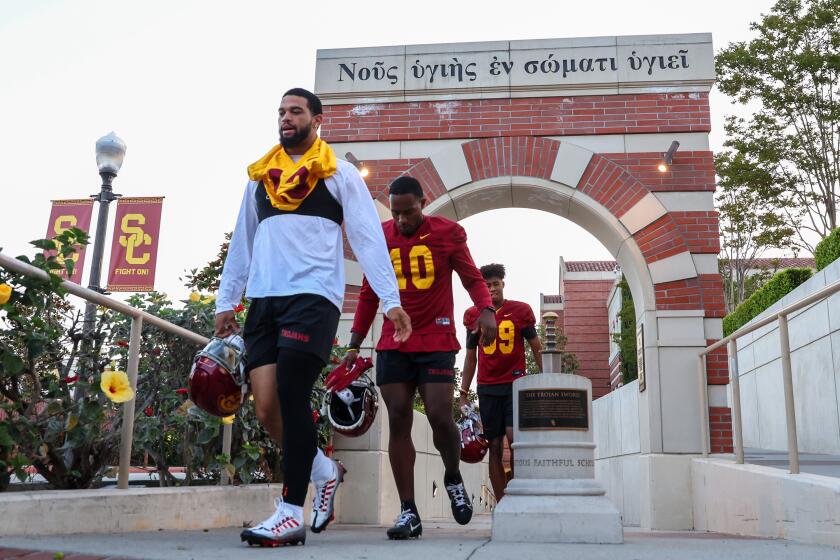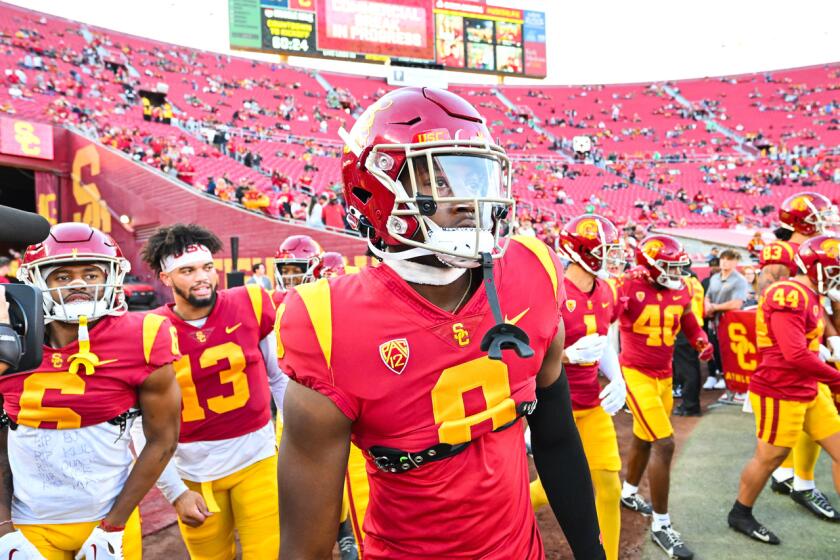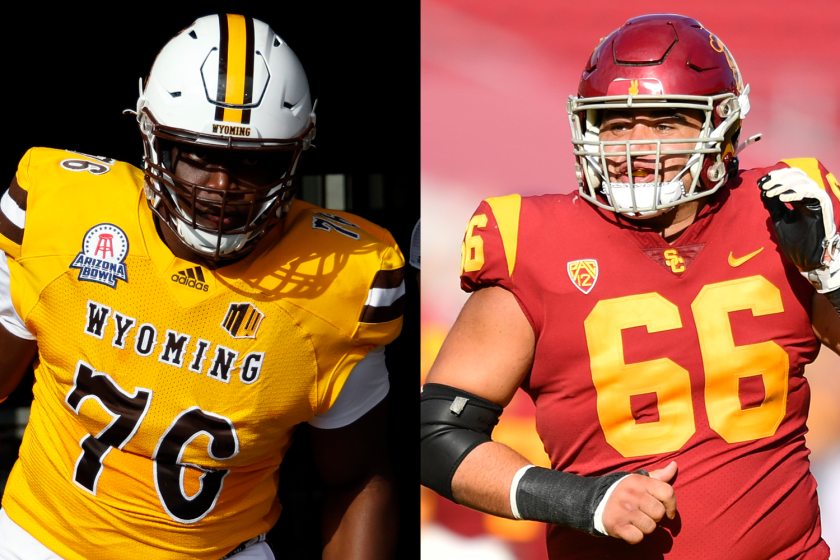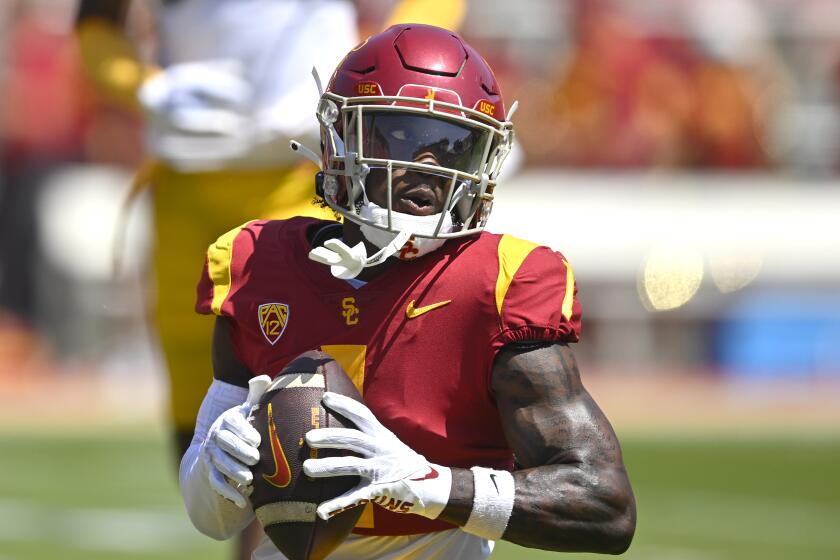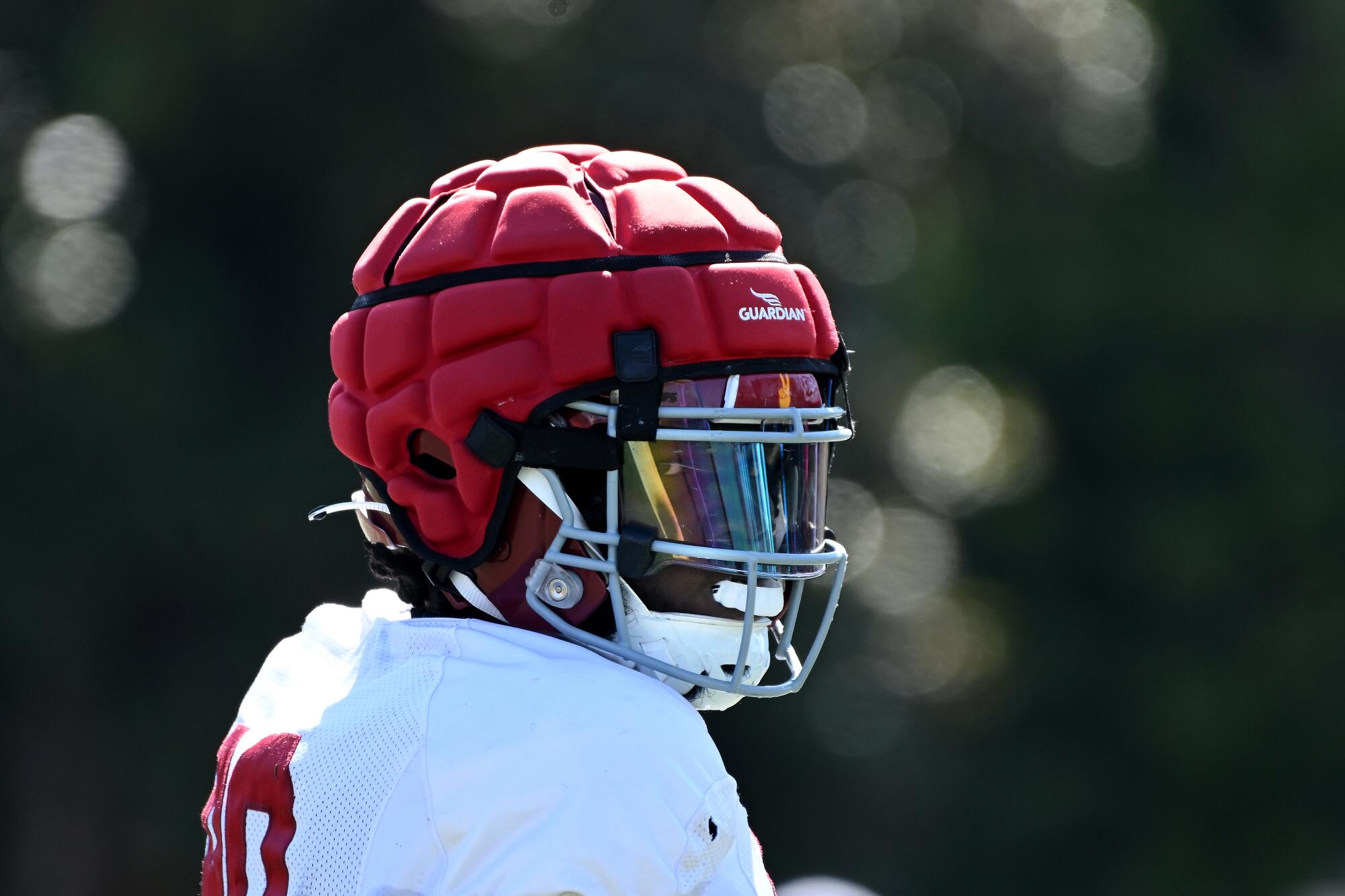
- Share via
Keithian Alexander was just a few months old when his father, Keith, was arrested.
Keith Alexander already had six prior arrests. But this time, in May 2004, the punishment was especially severe: Keith was sentenced to 30 years on felony drug charges, leaving a young son to navigate life without a father.
Even still, as the years passed, Keithian kept a piece of his father close. Around Terrell, Texas, east of Dallas, folks knew Keith by a different name, one that would be passed down to his son, who would give it a different sort of notoriety. One day, every major college football coach in the country would know the name Bear Alexander.
At USC, his name alone has been a symbol of hope for a defense in desperate need of some. But “Bear” meant something entirely different in Terrell where he grew up. Out of respect for his father, who was granted early release in 2019, Keithian still carried the name proudly, never forgetting where he came from. But over the years, as “Little Bear” bounced from high school to high school, emerging as the 300-pound, blue-chip behemoth his father once hoped to become, it would serve as a constant reminder of what he was outrunning.
“I just wanted to live his name in a different way,” Bear Alexander said recently. “Go out there, and do it better than he did.”
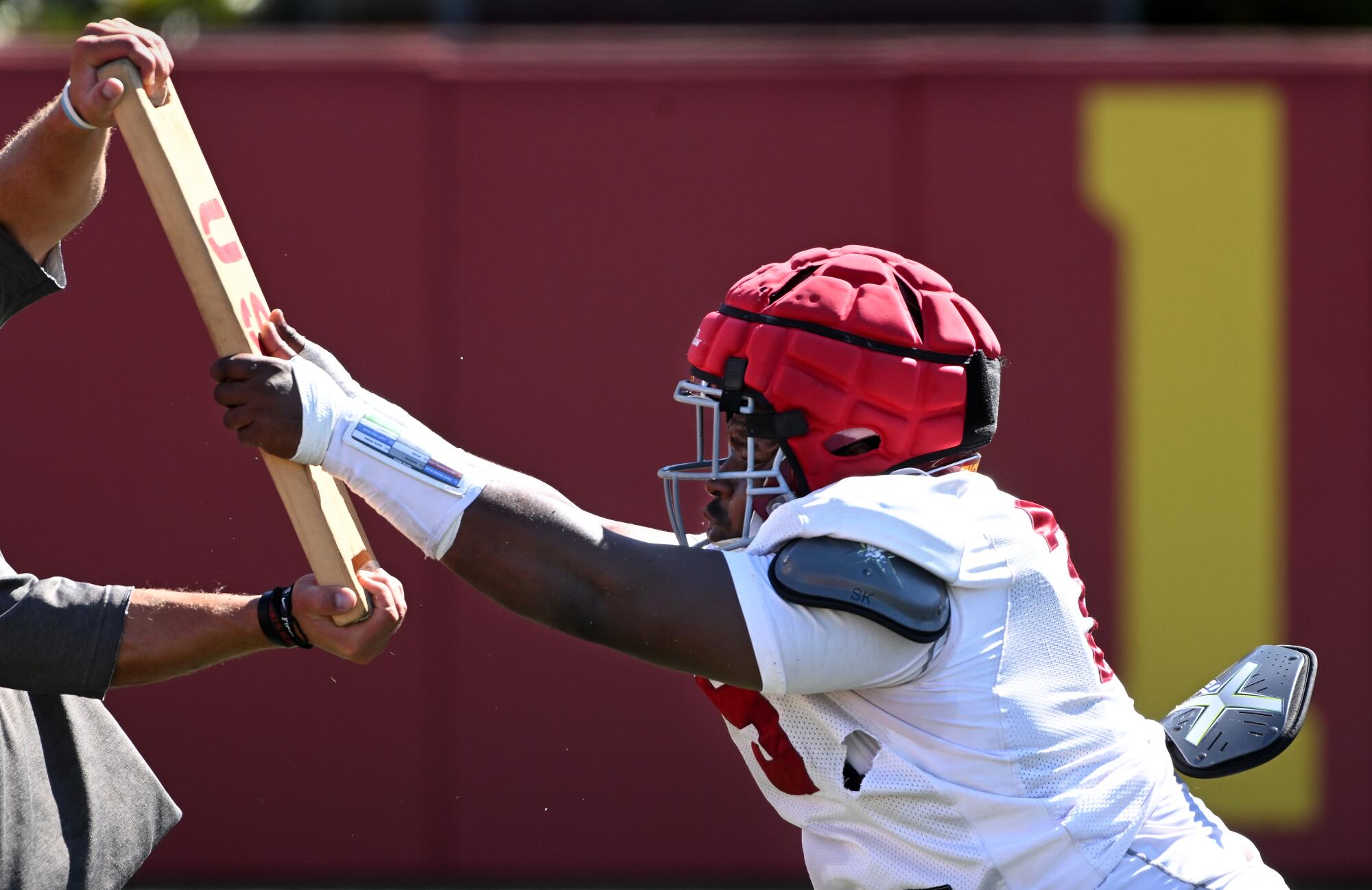
There’s a determination behind his thick Texas drawl, a sense of purpose that wasn’t present just a few years ago. Nothing was certain about Alexander’s life then. Football wasn’t a priority. Trouble seemed to lurk around every corner.
“I was just trying to escape,” he said.
Then, he met Tony Jones. “And he showed me the way of life.”
USC wrapped fall camp this week, with all eyes on its season opener against San Jose State. Here’s what you need to know from the final days of camp.
Their relationship sent Alexander down a different path, leading him out of Terrell and eventually to Los Angeles, where Alexander will debut in one week as the new anchor of USC’s rebuilt defensive line.
Every step of the way, Jones has been there. Today, Alexander refers to him by a different name — dad.
Tony Jones knew firsthand what it meant to be raised in an unstable home. His mom struggled with addiction, so he bounced around as a kid, never quite feeling safe in his own surroundings. He often wondered how much better off he’d be with different parents. But as Jones grew, he resolved to give other kids what his parents could never give him.
So he became a local football coach and leader with Young Life, a Christian youth ministry, both of which put him around kids in need of mentorship.
“I always ended up with the bad-ass kids,” Jones said, with a laugh.
He figured he could understand them like others couldn’t. Heck, he was them. Jones was still just 19 at the time, a college student barely established in his own life.
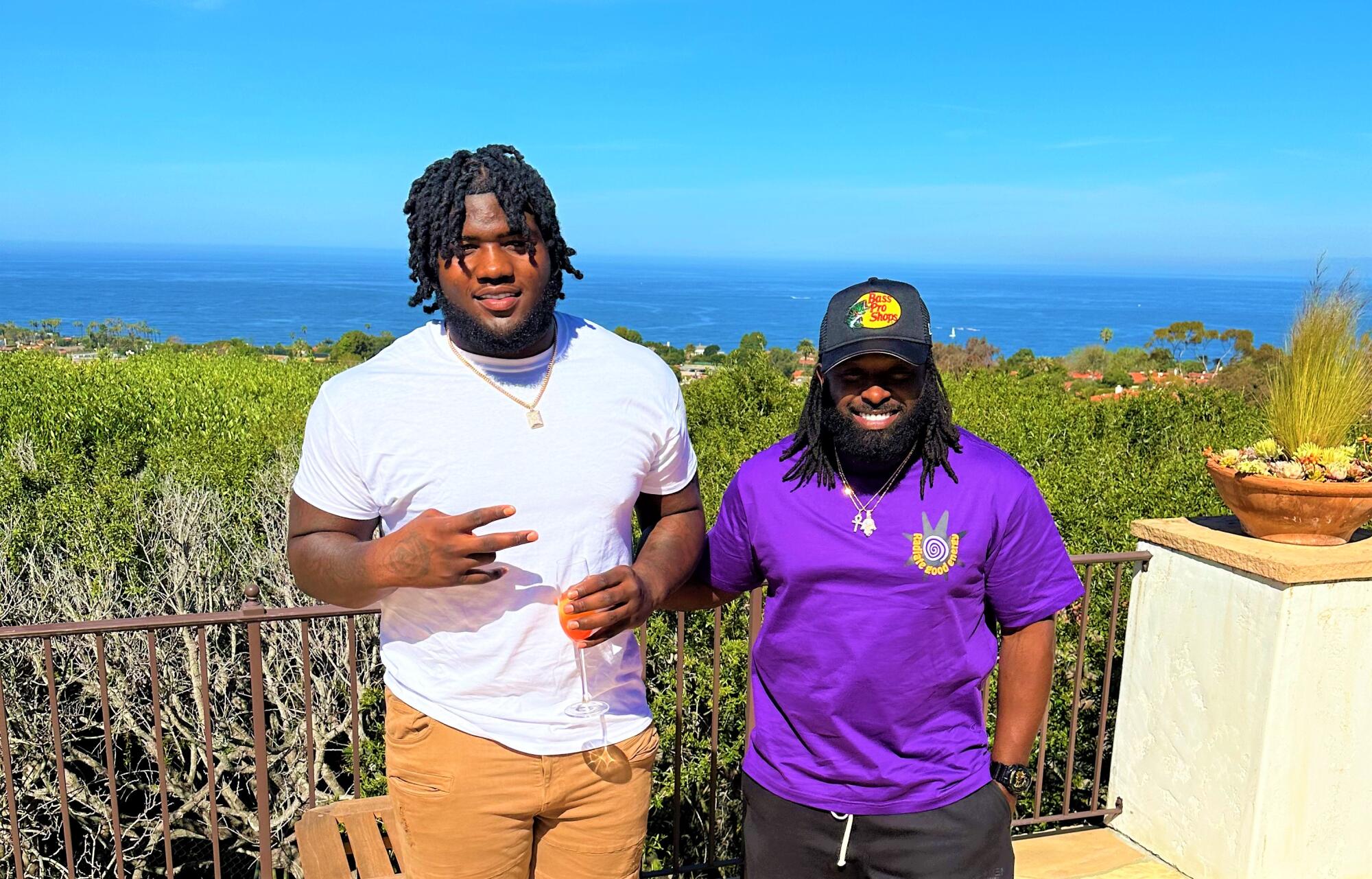
By 21, he realized some kids needed more than just a mentor, so he offered up more of himself. Periodically, kids who needed a place would crash with him. A weekend here, a week there. “Then,” Jones said, “it just turned into they wouldn’t leave.”
Alexander was in the eighth grade when he first started coming around. He was a friend of Jones’ nephews, and the reputation behind his name preceded him.
“He was mischievous,” Jones said. “Like, sneaky bad, doing things he didn’t have business doing, hanging out with older kids.”
But Jones understood his situation. Even saw a bit of himself in Alexander. His home life was tenuous and unreliable. He didn’t have much supervision or support.
Jones worried about where Alexander’s life was headed. He tried to give Alexander space just to be a kid, to take the pressure off his shoulders.
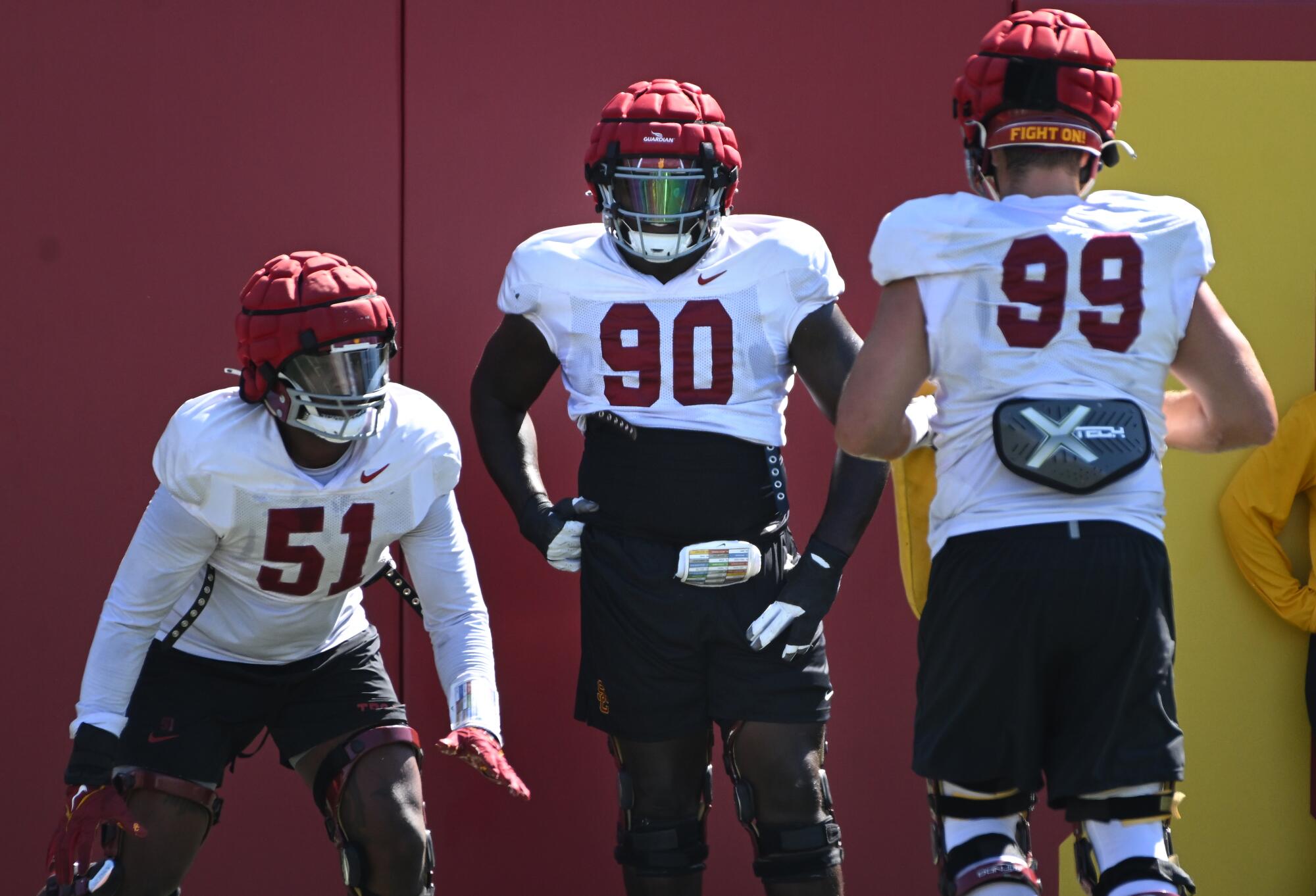
“His dad was a guy in that neighborhood and people expected something out of him because of the reputation his dad had,” Jones said. “I understood that. I was from that walk. I understood what changed my life. That’s just what I tried to provide him, and I was just hoping it would be good enough.”
Early into his freshman year at Terrell High, Alexander stopped bothering to go home. Jones, who worked at the school, got a call one day from the school counselor. Alexander was upset about an incident at home. He refused to speak to anyone but Coach Jones.
“He had been hustling, and he was hiding it from me,” Jones said.
How did the Pac-12 die? These surprising decisions by USC, Oregon, Washington and others thwarted efforts to save the conference.
The money he pocketed had since been stolen by someone at home. Jones could tell Alexander had reached a breaking point and asked him whether he wanted to be a kid or an adult.
“He was crying, and he was pissed off,” Jones said. “He just wanted to be a kid.”
From that day on, Alexander stayed with Jones full-time. But it wasn’t an easy transition. Jones was empathetic, but also firm. He offered structure and supervision that Alexander never had before. There were rules, expectations, family responsibilities.
But there was also unconditional love. It was the first thing Jones set out to prove to his new protege. Regardless of what they might go through together, he wasn’t going anywhere.
“I just gave him the family I knew he wanted,” Jones said. “Because I feel like that’s what I always wanted growing up.”
Still, it took time for Alexander to adjust.
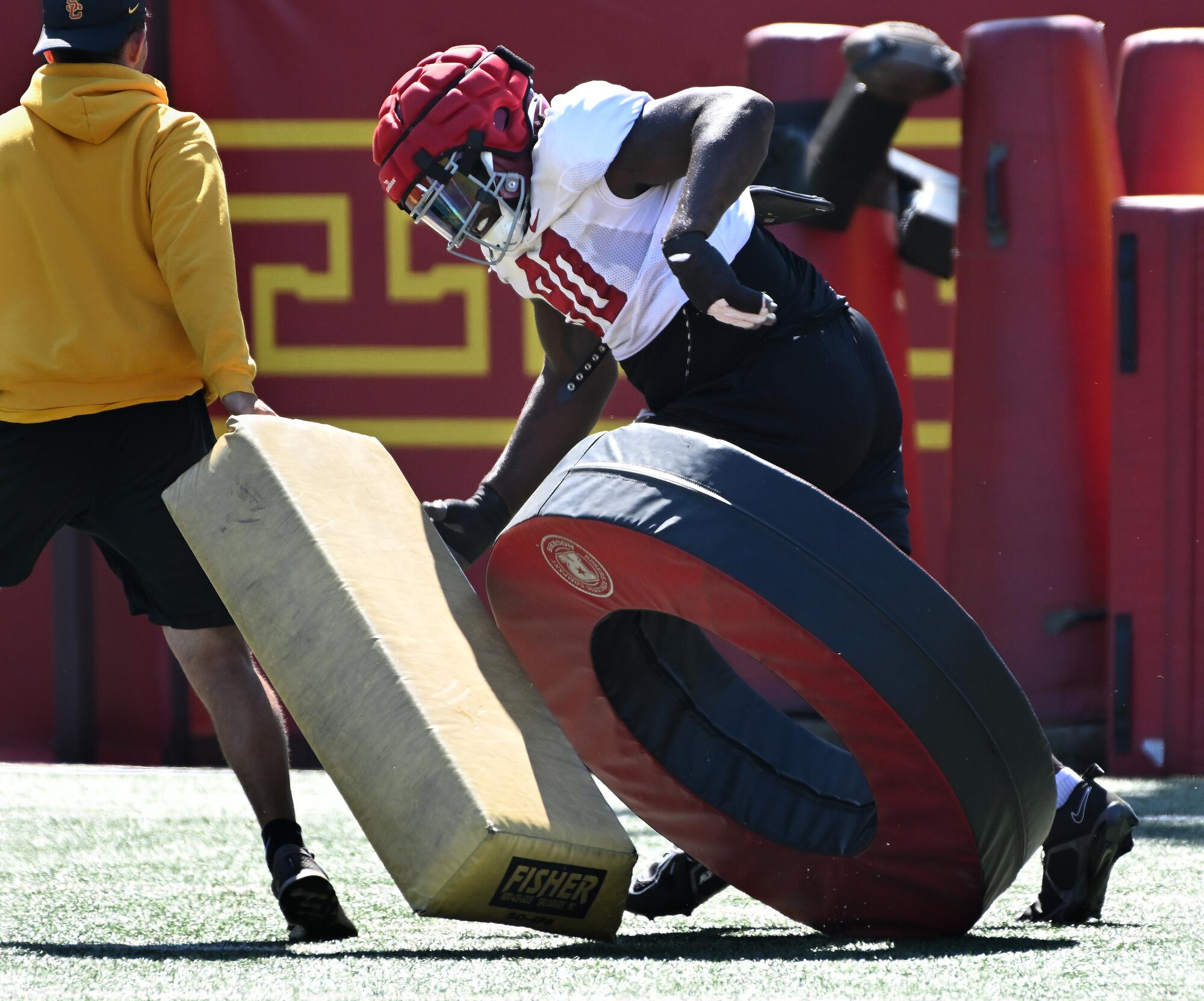
“He pushed me in every way possible,” Jones said. “It was a battle.”
As a sophomore at a new high school in Dallas, the fighting only escalated. Suddenly, Jones says, there were others in Alexander’s ear, pulling him in different directions. Then, one day, Alexander left the house and didn’t come back.
He was gone for a week before Jones got a call from someone at Skyline High, his new school. Alexander had been in an altercation and was suspended.
Jones welcomed Alexander back. But it wasn’t so simple at Skyline. The district’s executive committee ruled that Alexander transferred there for athletic purposes, meaning he was ineligible to play as a sophomore. .
Jones said staff members at the school were whispering behind his back about his intentions for Alexander, whose recruitment as a college prospect was really starting to heat up.
“They actually ruined my name in the city, honestly,” Jones said. “They would call me a handler and told people I was his agent.”
The accusations cut deep, given all Jones had sacrificed in silence. He’d always tried his best to maintain a sense of stability for Alexander and his own two kids, but the truth, by that point, was he’d fallen into deep financial trouble. Jones took an extra job at a call center, just to make ends meet. Alexander got a job at Dollar General to help out.
But soon, the house was in foreclosure. The future, for both, suddenly felt uncertain.
By that Christmas, it wasn’t clear where their lives were headed. But the holiday offered some perspective. They’d weathered so much together by that point. For Alexander, it finally seemed to settle in that Jones wasn’t going anywhere. He started to open up more to Jones about what he’d been through.
After a year of toil coming off a major knee injury, Zion Branch has impressed coach Lincoln Riley in his quest for a leading role in the USC secondary.
With college programs now reaching out regularly, Alexander knew he needed them to understand Jones’ unique place in his life. But what should he call him around recruiters? How do you explain what Jones meant, without them wondering about his intentions?
“He decided that day to call me ‘Pop,’” Jones recalled.
The meaning of the label wasn’t lost on him. As time passed, Alexander stopped trying to explain the unique nature of their relationship. Though, eventually, it didn’t feel like he needed to.
“For him to call me that at that time, it meant everything,” Jones said. “It helped me understand that he gets it.”
But not everyone would be so understanding.
Alexander’s talent had always been tantalizing. He was, after all, a nimble-footed, 340-pound wrecking ball, capable of steamrolling through any double team. As a freshman at Terrell, he was named the district’s newcomer of the year.
“You felt like like he could really develop into something,” said USC coach Lincoln Riley, who first recruited him at Oklahoma.
But when Jones met Alexander, the talent didn’t match the motivation.
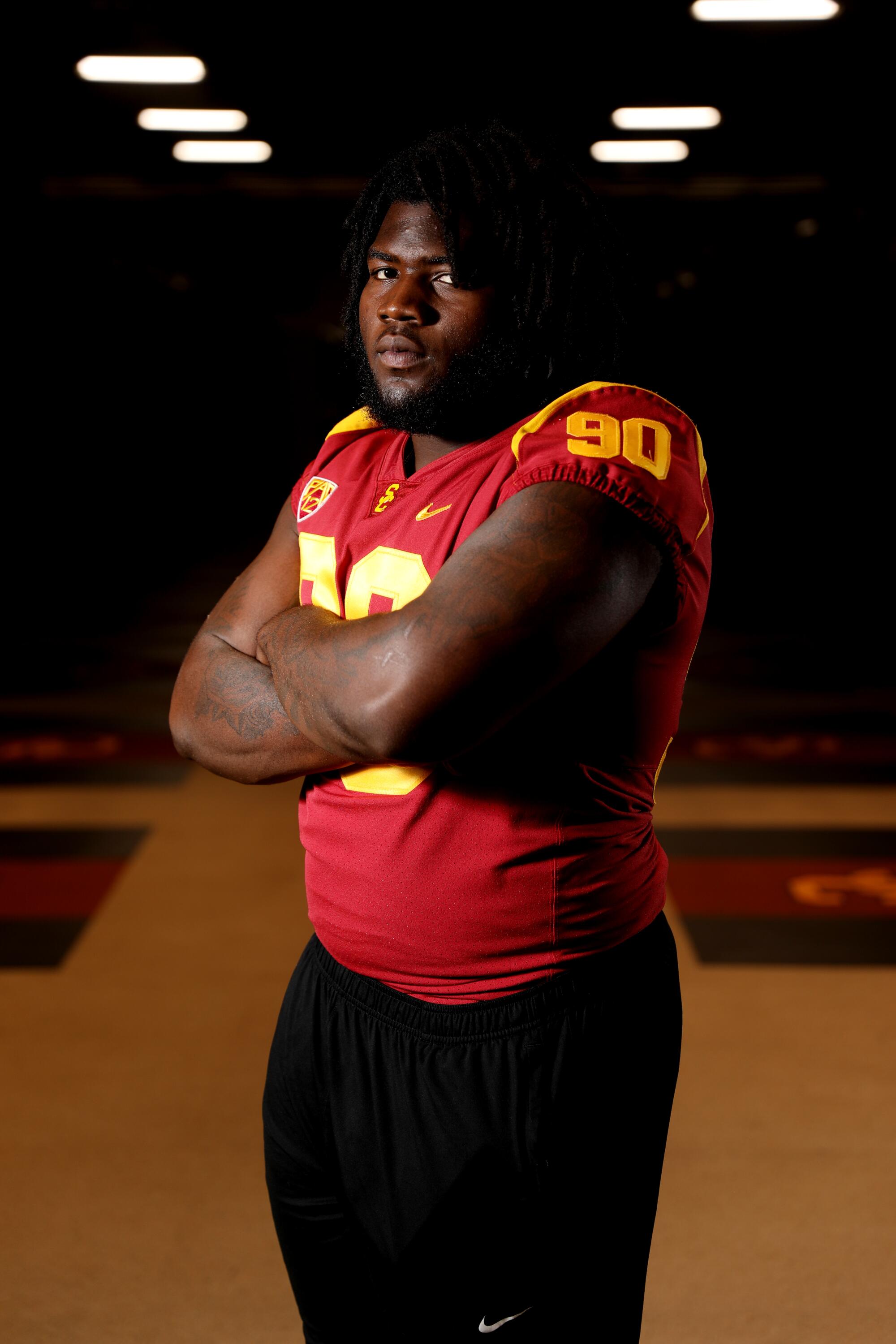
“Football was just kind of a thing he did,” Jones said. “He wasn’t real serious about it.”
All that changed after Jones pulled him out of Skyline.
“He started to take complete ownership of the process,” Jones said. “It stopped being about me waking him up to go work out. He wanted to go to church more. He wanted nothing of the sh— he had been doing. That’s when everything blew open.”
Jones got a teaching job at Denton Ryan High, and so Alexander, with a renewed sense of purpose, followed and joined one of the state’s top football programs. They drove an hour and a half each way to get to Denton, the long drives only bringing them closer over the course of that year.
“You start to talk like each other, act like each other, do everything together,” Alexander said.
But once again, the district’s governing body didn’t approve of the arrangement, holding Alexander out of games until they could determine whether he was eligible. It didn’t matter that Jones worked at Ryan. Or that Alexander’s relationship with his biological parents was strained. The committee saw a top prospect transferring to his third school in three years, with a man who wasn’t technically his father.
“I’m not Bear’s biological dad, but he sees me as such, and I see him as no different,” Jones said. “But the state of Texas frowned upon our relationship. Even though they won’t ever come out and say it, that’s definitely what it was.”
Emmanuel Pregnon joined USC via the transfer portal and is battling Gino Quinones, who has been with the Trojans since 2019, for the starting left guard job.
Coaches at Denton Ryan had no trouble seeing what Jones meant to him. Dave Henigan, Ryan’s head coach at the time, spoke at a hearing on his behalf. His mother wrote an affidavit to the committee, explaining the relationship.
“He needed someone he can count on, someone to give him guidance, and Tony was that guy for him,” said Aaron De La Torre, Denton Ryan’s defensive coordinator.
By the time Alexander was finally ruled eligible as a junior, he hadn’t played for nearly two calendar years. His late arrival would help lead Denton Ryan to a state championship.
“It was super frustrating, just knowing that people were attacking the situation,” Alexander said.
The constant fights with the district over his eligibility triggered painful memories for Jones. Years before he met Alexander, he’d taken in Taydren Young, who like Alexander had come to him in search of guidance. Jones said he was 21 and barely left Young’s side, trying to offer stability.
For a while, Young seemed on the right track. Then, as a senior, he was ruled ineligible to play football by the University Interscholastic League of Texas, the same governing body that would later question Alexander. Young decided to move home and Jones worried about him.
“He wanted to go back and play ball,” Jones said. “Within a year, that kid was dead.”
USC freshman wide receiver Zachariah Branch is making an immediate impact among teammates and coaches in his quest for targets heading into the 2023 season.
Young’s shooting death in 2016 shook Jones to his core. Talking about it still brings tears to his eyes. He told himself from then on that he’d never let a kid go back to what he knew was a bad situation.
“These kids need a different type of understanding, a different type of love sometimes,” Jones said. “I don’t think we should compromise their athletic future to make a point.”
Alexander’s future looked especially bright after Denton Ryan’s state title run. He had a scholarship offer to Georgia in hand. So he pushed Jones to make his own plans and promised he would follow. Jones got a job at Brewer High in Fort Worth, much closer to home.
And for the third time in four years, the UIL ruled Alexander ineligible. This time, though, he didn’t wait around at Brewer. Alexander transferred instead to IMG Academy in Bradenton, Fla., his fifth school in four years, and finished out his tumultuous high school run.
“This game gets dirty, bro,” Jones said. “It’s hard on someone trying to love a kid purely and keep him away from bullsh—.”
In Athens, Georgia, there were no such doubts awaiting Alexander. No one in the SEC cared about his bloodlines. He played in 12 games for the eventual national champions and notched a sack in the title game.
Jones had very specific expectations of where Alexander’s trajectory should take him as a sophomore at Georgia. He says he was assured by Georgia’s staff of the major role Alexander would play this season. But when he wasn’t the clear-cut starter at defensive tackle in spring, Jones felt betrayed.
“If I can’t trust you with what you say, I’m out,” Jones said. “That’s what it got to [at Georgia].”
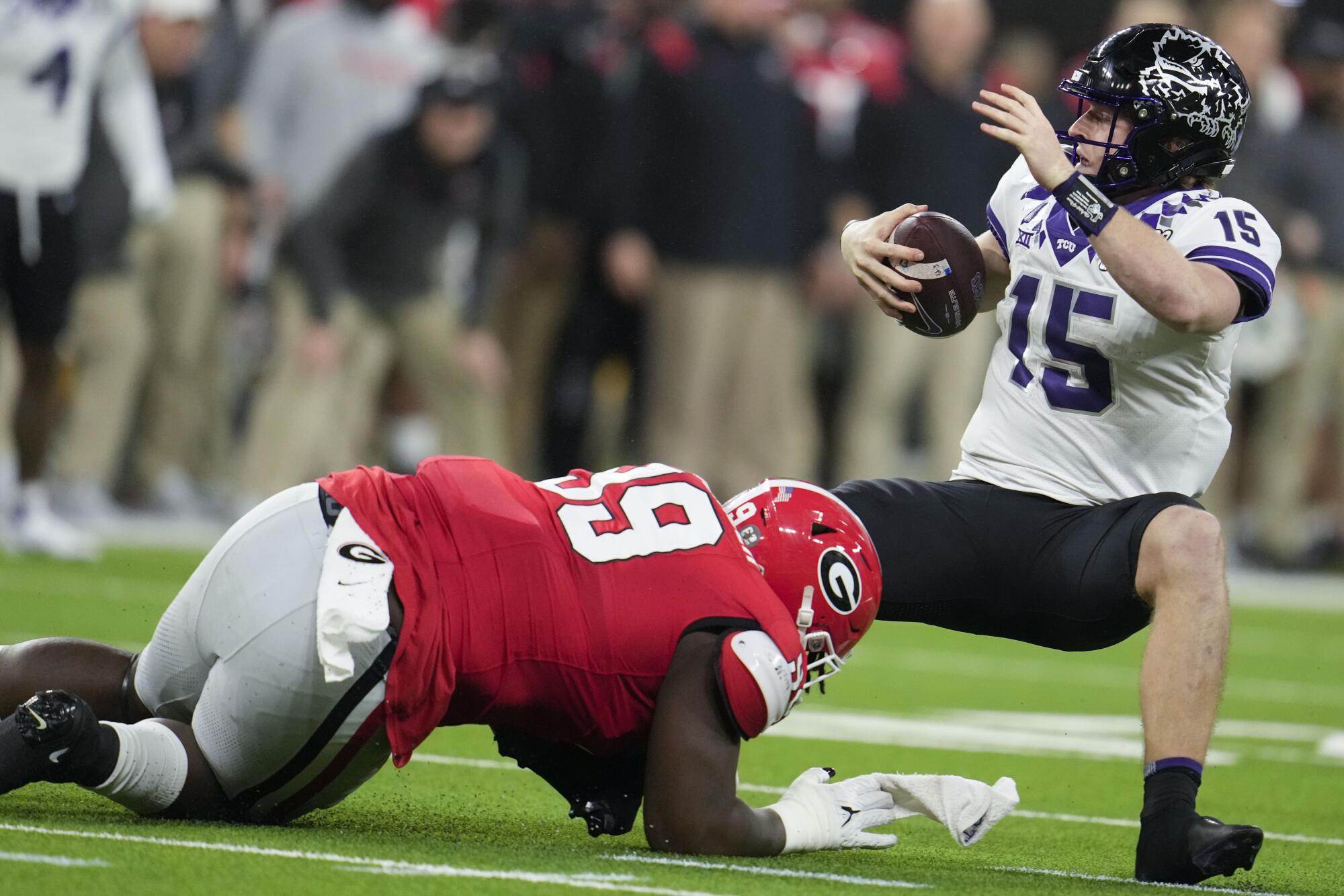
Alexander entered the NCAA transfer portal in April with his eyes trained firmly on USC and Riley. Riley had recruited Alexander while he was coaching at Oklahoma, at one point even convincing him to secretly commit to the Sooners. But Jones says he worried at the time that Riley might leave Norman for the NFL.
Riley didn’t have to do much convincing this time, with Alexander or Jones.
“It wasn’t really much of a thought,” Alexander said earlier this month. “It was a relationship that had already been developed. It picked up pretty quick.”
Alexander is still putting down roots at USC, but he’s expected to help immediately improve the Trojans’ defense. In L.A., he’s a long way from home and from Jones, who still calls or texts him every day, just to check in.
Jones used to worry what might happen with so much distance between them. But he doesn’t think that way anymore. He’s seen how far Alexander has come since they first met, how they’d stuck together through it all.
“He gave me an avenue to be myself, to grow, to learn, to understand it’s OK to make mistakes,” Alexander said. “He showed me the ropes.”
It was all he could ask for out of a father.
More to Read
Go beyond the scoreboard
Get the latest on L.A.'s teams in the daily Sports Report newsletter.
You may occasionally receive promotional content from the Los Angeles Times.

